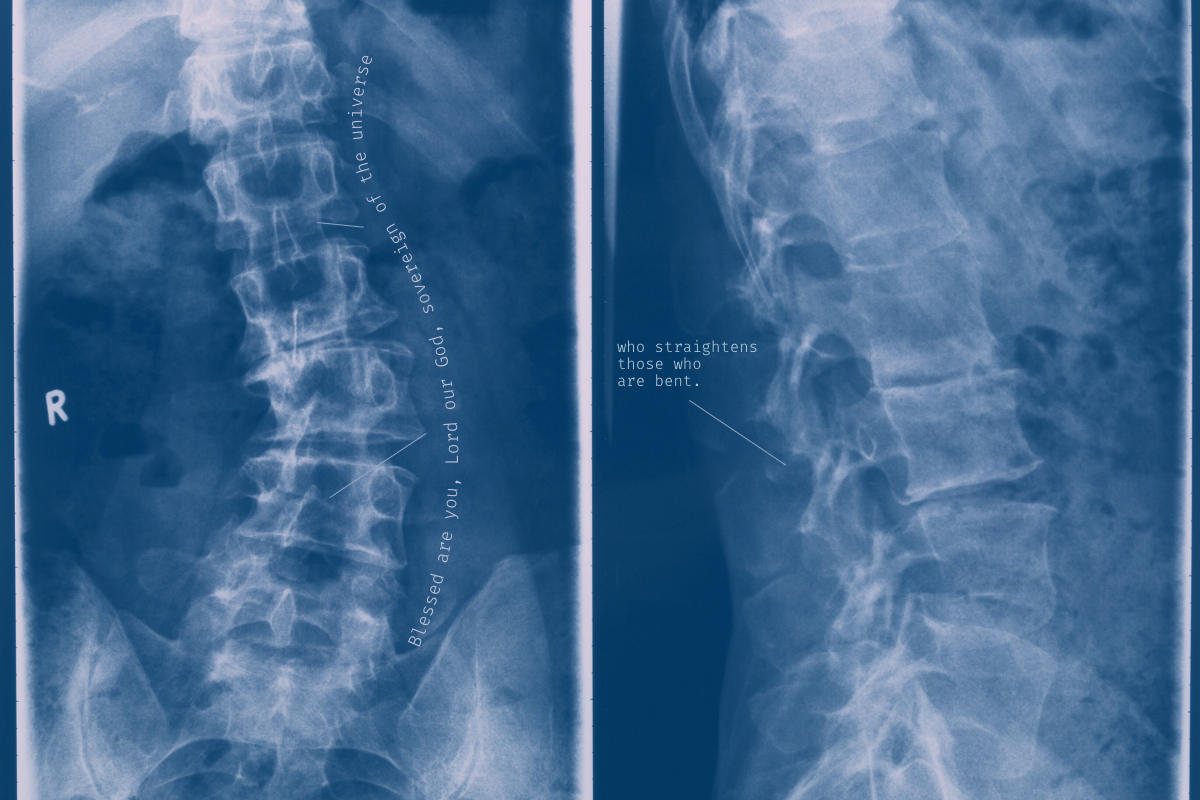July 11, 2023 is the 10-year anniversary of my spinal fusion surgery. When I was 16 years old, a team of surgeons cut into my back, twisted my spine 50 degrees into an (almost) straight position, drilled in two titanium rods and 22 titanium screws, and left behind a 14-inch scar.
At the time of my surgery, I was living a very secular life. My Judaism existed around Hanukkah and the occasional Pesach seder, but nothing beyond that. However, I was always seeking out spirituality and a relationship with a higher power — whoever or whatever that may be.
I began actively practicing Judaism during my sophomore year of college and have created an authentically Jewish life for myself, including a Shabbat practice, Torah study and a Jewish community that I know I can lean on in times of joy and sorrow.
But this essay isn’t about my Jewish journey or about how I arrived at the spiritual place I find myself in today. It’s about the line in Birkot HaShachar (the morning blessings) that makes my heart skip a beat every time I recite it:
בָּרוּךְ אַתָּה ה’ אֱלהֵינוּ מֶלֶךְ הָעולָם. זוקֵף כְּפוּפִים
“Blessed are you, Lord our God, sovereign of the universe, who straightens those who are bent.”
The first time I read this in 2017, I thought, “zokef k’fufum, straightens those who are bent — that’s me!”
I was first diagnosed with scoliosis by a chiropractor when I was in eighth grade. He referred me to an orthopedic surgeon, whom I saw about once every six months as I continued growing. Between each visit, my spine curved several more degrees. My surgeon said that he would only operate if my spine passed a 50-degree angle and continued to curve after my growth plates closed. By July 2013, my spine was curved at a 55-degree angle and was on track to keep curving.
I spent four hours on an operating table, five days in the hospital, and six months recovering and adapting to my new body, now an inch-and-a-half taller. I was bent, and God created a world with science and modern medicine so that I could stand straight!
Of course, this blessing has nothing to do with scoliosis. Throughout the Amidah, Jews bow before God during select recitations of “Baruch atah.” By the time we say God’s name, we have straightened from our bent position. In the Talmud (Berakhot 12a), Shmuel argues in the name of Rav that this bowing sequence derives from Psalm 146:8 — “the Lord makes those who are bent stand straight.” Therefore, by the time one recites the name of God, they should be standing upright, meeting God face-to-face.
The spinal fusion surgery I had 10 years ago saved my life. Without the surgery, my spine would have continued to curve until it crushed my heart and lungs. But my back is not “fixed” — I still have many problems with it. I’m uncomfortable when someone touches the scar tissue (massages — no thank you!). I constantly need lumbar support. I can only carry heavy bags on my left shoulder (the side without the curve). I sleep with a pillow under my knees to create a “flat” position and support natural spine alignment. Some days, a spinal disc underneath the fusion slips and presses on my sciatic nerve, causing sciatica in my right leg; because of the disc, I do physical therapy exercises at least three times per week to prevent a second surgery.
I still have scoliosis. Like anyone with chronic pain, I have good days and bad days. The good days are great, but the bad days can be really bad and often seem quite daunting. They give me a love-hate relationship with all the bowing during services. I love the “zokef k’fufim” blessing, and I love that it gave me a new way to view my scoliosis and subsequent chronic back pain — but on the days when my back pain is flaring up, bowing is physically painful.
Still, the idea that God “straightens those who are bent” is comforting to me, and I hope it can bring comfort to all Jews with similar chronic illness. I was born at a time when my pain can be managed, when treatment options exist, and when I can use Judaism to find comfort in a difficult situation. I feel incredibly grateful to find myself in this blessing.



